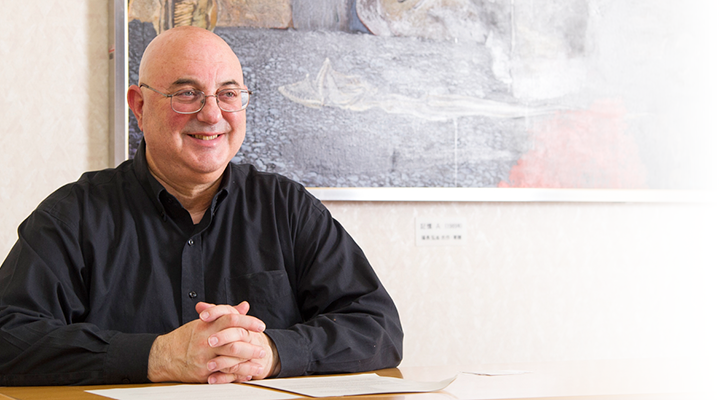
INTERVIEW
Training human resources with leadership skills
What skills are required to
become a leader? Acquire
those skills through
collaboration.
Professional Mentor
Prof. Eaton, David
Training human resources with leadership skills
Specializing in Natural Resource Policy Studies. Particularly proficient in development policy for water, air and waste products.

Professor Eaton specializes in Natural Resource Policy Studies at the Lyndon B. Johnson School of Public Affairs at the University of Texas at Austin. He is involved in education and research focused on the fields of the environment (centering on water, air, waste products and risk issues) and energy. Professor Eaton has taught in 20 countries, and participated in investigative research in 15 countries.
Professor Eaton specializes in water supply in rural communities, international conflict over water resources, energy management, industrial environmental issues, the operation of emergency medical services, the application of mathematical programming to resource issues, insurance and agriculture, and his list of publications to date is extensive.

In particular, Professor Eaton has focused on sustainable development in international river basins, assessment of energy and water preservation programs, and the prevention of pollution, and his works include the NAFTA Handbook for Water Resource Managers and Engineers, Emergency Medical Services in Travis County, Texas, and The Impacts of Trade Agreements on State Provincial Laws.
In his research in recent years, Professor Eaton has addressed topics such as environmental cooperation between America and Mexico, new methods for measuring air pollution emissions, joint management of groundwater by Palestine and Israel, and water preservation in Texas. The Texas Department of Insurance used research on tort reform directed by Eaton as evidence to justify rebates of over $1.3 billion for liability insurance in Texas in 1997-1999.
Thinking about oneself, and using that knowledge in collaborative group activities

In the Taoyaka Program, Professor Eaton teaches a subject called Leadership.
In this class, students consider what leadership is, and acquire a greater understanding of the relationship between those who lead and those who follow.
He says that the class is divided into three parts.
The first part is a class held in the classroom, where the students think in depth about their own skills and potential. This is a concentrated effort that takes place over four days.
In the second part, the focus is on learning how to take an academic approach to leadership. The students enhance their knowledge in an online-based class, through a teaching method known in America as a ‘flipped classroom’. The ten lectures are released on YouTube and students are able to view them at any time during the semester. After viewing each lecture, the students submit an essay, and discussions on content are held via email and Skype.
In the third part of the course, the students gather once again in the classroom, where they undergo leadership training by through collaborative group work addressing a number of different situations. Ultimately, the students give presentations on how they would like to make use of the leadership training that they have experienced through this class in the Taoyaka Program and, in the future, in society.
This education subject is training for the students to put leadership into practice, and also forms part of the preparation for the fieldwork in the onsite education that follows.
I want to fully support hardworking students who learn from hands-on experience

Professor Eaton says “My own research is multidisciplinary, so I actually feel that the multidisciplinary style is easy for me”. He also evaluates the Taoyaka Program as “an extremely challenging program”.
“Trying to obtain a doctoral degree is hard enough. The students in this program have to deal with not only their own field of specialty, but also have to undertake practical cross-disciplinary studies in other fields as well. On top of that they need to learn how they can collaborate with each other through their respective fields. In other words, learning by working together and collaborating with people from other fields is a key point of the Taoyaka Program”, he says.
Professor Eaton also states frankly that “Even if students complete the program, if they have not become people who can put leadership into practice then the goal of the Taoyaka Program has not been achieved”.
He says that experience in various different fields and a background of academic knowledge form the base to build the confidence to become a leader.
“Proactively trying something, overcoming your failures, deepening your understanding of yourself and others. It is experiences like these that build confidence. I want the students who study here to have confidence in what they are doing as they leave and start a new life. I’ll do anything I can to help them achieve that”.
![]()
Eaton, David
Professor, School of Public Affairs, a graduate component of The University of Texas at Austin
1971 A.B. in Biology, Oberlin College
1972 M. of Public Works, The University of Pittsburgh
1972 M.Sc. in Environmental Health, The University of Pittsburgh
1997 Ph.D. in Environmental Engineering and Geography, The Johns Hopkins University
Current Positions
Special Fellow (Advisor), United Nations Institute for Training and Research (UNITAR) (1997-2010); Director, The University of Texas at Austin Center for Environmental Resource Management; Co-Chair, Kozmetsky Global Collaboratory, and Co-Chair, Cross-Border Initiative for Research and Development, The University of Texas at Austin
Previous Positions
Co-Director, Yellow River Basin Water Resources Economic Modeling Study (1990-1993); Research Assistant, The World Bank (1975-1976); Foreign Affairs Specialist, U.S. Agency for International Development (1975-1976); Research Associate and Consultant, Energy Research and Development Policy (1974-1975); Research Assistant, U.S. President’s Council on Environmental Quality (1970-1972)





